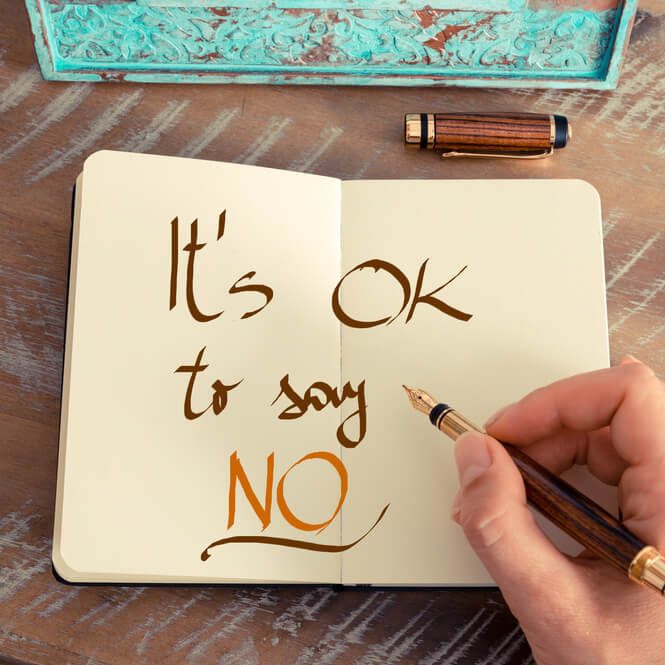5 Minute Read

Fiercely protecting your free time and getting comfortable with setting boundaries could transform your energy and stress levels and revive your self-esteem, writes Fiona Cowood…
“Please stop, I don’t like that, I’m feeling uncomfortable, I need more space!” So goes the chorus of The Boundaries song, a hit song that gives kids the language to say no to things they don’t like. A real earworm, (think twice before requesting it from Alexa), the ‘boundaries song’ hashtag has racked up more than six million views on Tik Tok with parents posting cute videos of their pre-school kids singing, ‘Not around me, don’t take it personally, that’s a boundary…”
The song has obviously chimed with a generation of boundary-aware parents who don’t want their own children to grow up with ‘yes’ as their default. But kids aren’t the only ones who need have the confidence to say ‘no’.
Clinical psychologist Dr Emma Hepburn, who shares her insights on emotional and mental wellbeing through illustrations as @thepsychologymum on Instagram, says the term ‘boundaries’ grew out of the self-help boom of the 1990’s. In a general sense, she says setting boundaries is about prioritising your wellbeing by “protecting your time, your needs, your emotional space and your physical space.” For some people, communicating these limits comes easily, but for others – especially and often women who take on much of the caregiving and nurturing – it can feel alien.
“The caring role, which women traditionally take, involves looking after other people’s needs first, which means our own needs come last. And because we’ll never be able to finish everything involved in the emotional load, those needs might never get addressed,” explains Dr Hepburn, who has written new book – A toolkit for your emotions. “We might even feel guilty about looking after our needs at all. The other thing fuelling this is the productivity myth – this idea that rest is luxurious. We’re somehow told that doing things that replenish you isn’t right, which creates more guilt.”

The concept of boundaries seeks to stop us from falling (headfirst, exhausted) into this trap. In practice, it means getting comfortable with the words ‘no’ or ‘not right now’, whether you’re being asked to look after your neighbour’s kids, work through your lunch break, run a school tombola or plan a baby shower.
“Putting boundaries in place reduces your stress and gives you back time,” explains Dr Hepburn. “It enables us to think about how we use our time in a way that is of value to us, which actually helps build our identity. Doing the things you want to do rather than only the things you’re asked or told to do, builds up your sense of who you are as a person.
“It’s also better for those around you. If, as parents, we’re depleted, overloaded or overstressed, we’re less able to provide for our children. By seeing to your own needs first, you’re actually better able to be there for your kids and loved ones, and enjoy your time with them.”
“Figuring out your limits and preloading your ‘no’ responses is an investment worth making.”
The simple trick to start setting boundaries
So, if setting boundaries doesn’t come naturally, how can you get better at it? Dr Hepburn says the trick is to get out of the habit of being the responder to everyone else – “being always ‘on’ and reactive to everyone else’s needs is stressful and demanding on the brain”. A simple trick, she says, is to use the words ‘Can I think about that?’ where you might have previously leapt in with a ‘Sure! No problem!’ This buys you precious time to work out if saying ‘yes’ is going to mean too much compromise and sacrifice. She also suggests working out ‘scripts’ that allow you to say ‘no’ in a way that sits more comfortably with you. “For some people, it will be a lot easier to say, “I’m really sorry but I can’t do that right now because I don’t have time” instead of a flat-out ‘no,’” says Dr Hepburn.
It’s no easy task to start erecting boundaries when you’ve traditionally been that go-to ‘yes’ person. It can prompt raised eyebrows from friends, confusion from relatives and even anger from those closest to you. But if you explain in simple terms that you’re unable to do something because you don’t have the time or energy, the response is usually kinder than you anticipate – “you might even find people stepping up to help,” she says.
Similarly, rather than think negatively of you, work colleagues will respect you more for clearly indicating your boundaries by blocking out time in your calendar or requesting no disturbances. People appreciate clarity, says Dr Hepburn, adding that it doesn’t mean you won’t help out or stay late sometimes. “Of course we need to think about other people’s needs, but articulating your boundaries sends out a signal. And the more we practise, the better we get at it, and the easier it will be in the future.”
This snowballing effect means that however uncomfortable it might feel in the beginning, figuring out your limits and preloading your ‘no’ responses is an investment worth making. And if you get stuck, there’s always the boundary song to help you along the journey…
Share this article…





